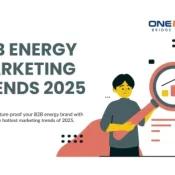
The Power of Data Analytics in B2B IT/Tech Marketing
The digital transformation is unlocking countless opportunities for IT and tech companies to thrive. It’s an exciting time to build your digital capabilities, ensuring you send the right message to the right customer at the right time. One tool that’s driving this success is Data analytics.
For B2B IT companies, data has become the key to cutting through the noise and focusing on what really matters—understanding and meeting your clients’ needs. By analyzing customer behavior, market trends, and campaign results, marketers can make smarter decisions, leading to better business outcomes.
A Breakaway Approach for New Growth
Taking a tech startup to enterprise level requires a shift from traditional, gut-feeling marketing to a data-driven strategy. When marketing efforts are guided by data, decisions are more precise, predictable, and effective.
In today’s fast-paced market, where customer needs evolve quickly and digital channels grow by the day, data helps you stay ahead. It provides valuable insights that can nurture connections with key decision-makers, opening up opportunities for disruptive growth.
Companies that are using data-driven B2B sales-growth engines report above-market growth and EBITDA increases in the range of 15 to 25 percent. (McKinsey & Company)
So, how can data become your game changer?
Data fuels your growth engine, giving your sales team the information they need to focus on what matters most—targeting the right leads, at the right time, with the right message. It helps them prioritize valuable opportunities, engage with prospects effectively, and manage their sales funnel with real-time visibility.
Key Benefits of Data & Analytics in Marketing:
- Identify Your Target Audience
Knowing who your audience is and what they want is key. With the right data, you can understand your target market better, making it easier to sell your services. - Personalized Marketing
Once you’ve identified your ideal customer profile, you can segment your audience and create personalized marketing campaigns that speak directly to their needs, leaving a lasting impact. - Understand the User Journey
By analyzing customer interactions across channels—like emails, social media, and website visits—you can gain insights into what drives prospects to make a purchase. This allows you to fine-tune your messaging and targeting strategies. - Optimize Your Campaigns
Track performance metrics like website traffic and conversion rates to see what’s working and what’s not. Regular adjustments ensure your campaigns deliver maximum ROI. - Predictive Analytics for Lead Scoring
Use data to score and qualify leads based on behavior, engagement, and characteristics. This helps your team focus on leads that are most likely to convert, making your resources more efficiently utilized. - Enhance Customer Experience
Data can help you understand customer pain points and preferences. By taking action on these insights, you can tailor your services, improving customer satisfaction and increasing their lifetime value. - Data-Driven Content Strategy
Your customers provide valuable first-party data that can shape your content strategy. Create content that answers their questions and positions your brand as a thought leader. Competitive and industry data can also guide you in creating a winning strategy.
Embrace Data-Driven Marketing
As digital channels grow, more data becomes available. B2B IT companies are ramping up their use of data to improve their marketing strategies, reduce costs, and streamline their operations. Even smaller companies are investing in predictive analytics for long-term growth.
It’s time to embrace data-driven marketing to unlock the full potential of your team and take your business to the next level.




